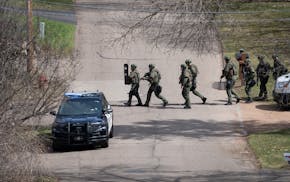A five-day national push to arrest immigrants with criminal convictions netted 29 people from 11 countries in Minnesota.
This week the Immigration and Customs Enforcement agency touted its Operation Cross Check, which yielded more than 2,000 arrests nationally between March 1 and 5, as evidence of a sharpened focus on rounding up and deporting convicted criminals and public safety threats.
Meanwhile, some immigrant advocates nationally and in Minnesota voiced concerns about the operation, the sixth such large-scale sweep since 2011. Some questioned the roundup of immigrants with DWI convictions, now deemed a high priority for deportation under new guidelines unveiled by the Obama administration in November.
Here in Minnesota, eight of the 29 arrested had felony convictions, which included sexual assault, aggravated assault, drug possession and weapons charges. The remainder had either repeat misdemeanors or what immigration authorities deem "a significant misdemeanor," a sometimes contentious category that includes a wide range of offenses. The majority of the misdemeanor offenders had DWIs, the ICE field office in St. Paul said.
"By taking these individuals off our streets and removing them from the country, we are making our communities safer for everyone," said ICE Director Sarah Saldaña in a statement about the national operation.
Of about 2,060 immigrants from 94 countries detained nationally, "more than half" had felony convictions, ICE said. Roughly 90 were convicted sex offenders, and 58 were described as known gang members.
In Minnesota, the sweep rounded up 15 immigrants from Mexico, three from Ecuador, two from Guatemala, two from Poland and one each from Ethiopia, Ghana, Kenya, Laos, Liberia, the United Kingdom and Vietnam. The detentions took place across the state, from Lake of the Woods to communities in southern Minnesota. Two of the 29 were women.
Besides DWI, misdemeanor offenses included domestic violence and public benefits fraud, ICE said. In addition to their criminal convictions, four of those detained had re-entered the country after a previous deportation.
ICE declined to release the names of the arrested immigrants, citing the Department of Homeland Security's privacy policy.
All eyes on enforcement
In November, as President Obama announced new or expanded deportation reprieve programs for immigrants without lawful status, he argued such steps would allow immigration authorities to focus more energy and resources on deporting criminals. At the time, the administration also released a revised set of deportation priorities that emphasize criminal background over previous immigration violations such as flouting a deportation order.
Since, Republican opponents of Obama's immigration plan in Congress have questioned the administration's commitment to tough enforcement against immigrants with criminal convictions.
But Linus Chan, with the Detainee Rights Clinic at the University of Minnesota, said it would be unfair to quickly dub the operation — the first such sweep since 2013 — as politically motivated. Still, he said that even as ICE highlights the most serious felony offenses involved in the sweep, immigrant advocates question how many people were detained because of more minor offenses they might have committed years ago.
Advocates are watching closely how aggressively immigration authorities will pursue those with DWI convictions, which are not grounds for removal under immigration statutes.
"There are a lot of questions that need to be answered," Chan said.
Meanwhile, advocates for a tougher stance on immigration such as the Washington, D.C.-based Center for Immigration Studies have also questioned these operations. They say ICE should try to deport more criminals at the time of their convictions rather than rounding them up after the fact — even as local law enforcement agencies have increasingly moved away from cooperation with immigration authorities.
Shawn Neudauer, an ICE spokesman in St. Paul, said these more targeted sweeps involve work field agents do year-round.
The St. Paul field office, which covers five states, deported 1,900 people last fiscal year, down from 5,929 in 2010.
"Our officers do this kind of work every day," he said. "It's not just this five-day period."
Mila Koumpilova • 612-673-4781

Man killed in Minnetonka by law enforcement started gun battle with deputies, BCA says

Should Hennepin County consider the race and gender of contractors it hires?
Search resumes in southwestern Minnesota for 15-year-old boy who jumped in lake after losing canoe paddle

Hockey coach with roots in Minneapolis Park and Rec dies at 81

